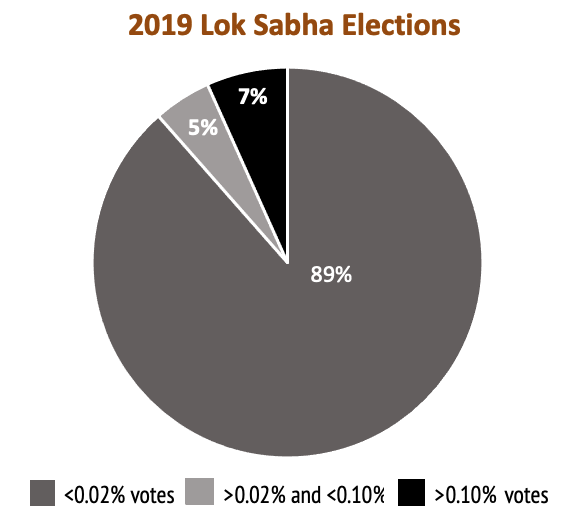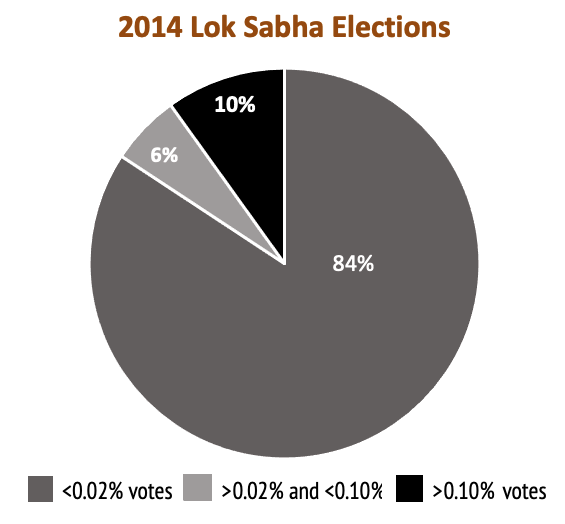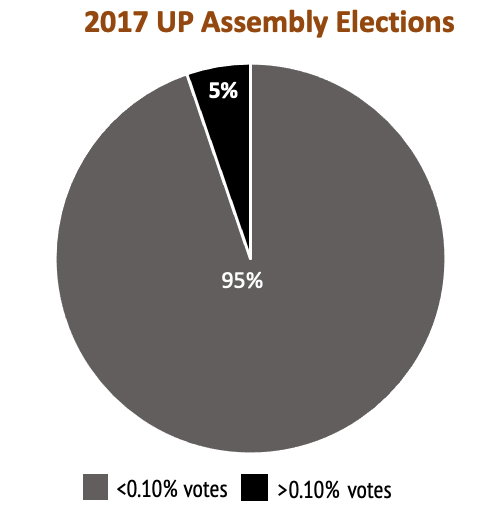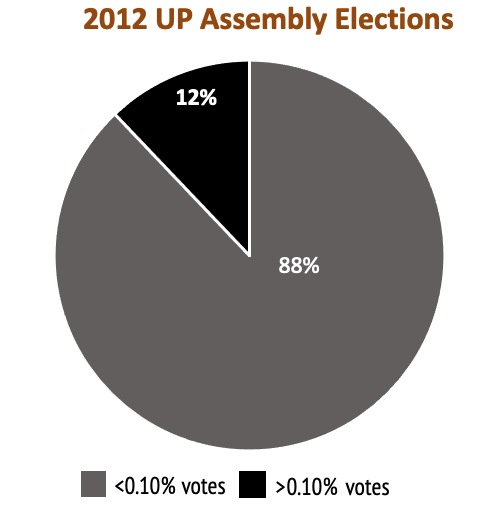
India is a diverse country and equally diverse are the issues or challenges it faces. As in any established democracy, people’s issues are generally championed by an organized group that lobbies for it with local, state, or national governing establishments. Eg: Mazdoor Kisaan Union Party, Bahujan Samaj Party, etc. Often, these organized groups take it upon themselves to support their cause and become part of the government by winning elections – and for this, a political party is formed.
As per Indian laws, political parties that wish to contest local, state, or national elections are required to be registered with the Election Commission of India (ECI). As per ECI, there were a total of 2,858 political parties registered with the Commission as of Sep 2021. Amongst these, there were 8 national parties, 54 state parties, and 2,796 unrecognized parties.
Registered unrecognized parties are ones that have either not secured a sufficient percentage of votes in the Assembly or General Elections to become a state party or have never contested the elections after being registered with the Election Commission. The number of unrecognized parties has increased by 158% in the last decade - from 1,112 parties in 2010 to 2,858 in 2021.
So, what is the reason for the unstoppable and rapid mushrooming of the unrecognized political parties who either do not contest elections at all and if, at all they do, it is nothing more than a disingenuous charade? The following two aspects are likely and reasonable assumptions:
1. Money laundering
Political parties are exempt from income tax for the donations collected by them. Section 13A exempts parties’ income from ‘house property’, ‘other sources’, ‘capital gains’, and ‘voluntary contributions’ from tax. Sections 29A and B of the RP Act, 1951 do not place any conditions, such as contesting of elections for collecting donations. A case in point is the Apna Desh Party of Uttar Pradesh which received a donation of ₹65 crores from 4,300 donors in the two years between Apr 2017 and March 2019 during which it contested just 3 seats in the 2017 UP Assembly elections and gathered only 2,136 votes.
The Electoral Bonds introduced in 2018 provide a further cover under which donations of unlimited amounts can be anonymously received from individuals and corporate companies in India and abroad. The corporate companies need not even be profit-making or ever have conducted any business (a.k.a. shell companies) to make donations of hundreds of crores of rupees to political parties.
Also read: Electoral Bonds - The black hole of untraceable funds in Indian politics
The financial secrecy of unrecognized political parties, for reasons unknown, is also evident from the fact that financial reports of only 78 of the 2,301 parties registered as of Mar 2019 are available in the public domain for the financial year 2018-19 and 82 parties for 2017-18 (Source: ADR)
2. Splitting votes for electoral gains
Given India’s first-past-the-post electoral system, a candidate with the most votes in a particular constituency is declared a winner even if he/she does not have majority support. Vote splitting thus becomes a common practice of political parties to achieve the electoral effect of distributing the votes amongst multiple candidates to reduce the winning chances of Opposition candidates. To achieve this, the political parties themselves sponsor multiple dummy candidates from inconsequential parties to contest the elections.
The data from the last 2 election cycles nationally and within Uttar Pradesh, the state representing the largest number of seats in the Lok Sabha, does lend some credibility to this theory as the number of fringe parties that have no real likelihood of a win or pose any serious contest are only increasing with each election.
 |
 |
A total of 670 political parties contested the 2019 Lok Sabha (General) Elections in which 61.3 crore votes were cast. Only 45 parties (7%) secured more than 0.1% (more than 5 lakh votes) and 89% of parties secured less than 0.02% votes (less than 1.5 lakh votes). In comparison, 84% of parties secured less than 0.02% of votes (less than 1.5 lakh votes) in the 2014 Lok Sabha elections.
 |
 |
A total of 303 political parties contested the 2017 Uttar Pradesh Assembly Elections in which 8.7 crore votes were cast. Only 16 parties (5%) secured more than 0.1% (more than 75 thousand votes) and 95% of parties secured less than 0.1% votes (less than 75 thousand votes). In comparison, 88% of parties secured less than 0.1% votes in the 2012 Uttar Pradesh Assembly Elections.
The Election Commission of India, though cognizant of the issue, is unable to de-register these inactive parties as they do not have the required legal authority. The buck stops only at the Ministry of Law and Justice who have yet to take a stand on this matter. The UPA and the NDA-led governments have both failed to find a solution to this problem, either for their own vested interests or simply because they find the issue not significant enough to be prioritized amongst other national challenges.
Until the government finds the political will, we as citizens of India, can only put our faith in our own judgment and vote for qualified and deserving candidates who just may find the courage to bell this unrecognized political cat.
TO READ THE FULL ARTICLE

Get full access to the exciting content on The Mirrority by logging in
Support independent journalism
Even the very best of media houses in our country today are yielding to the pressure of click-bait journalism in order to survive. More than ever before, our country needs journalism that is independent, fair and non-pliant to the bureaucracy. Such journalism needs the support of like-minded readers like you to help us survive editorially and financially.
Whether you live in India or India lives inside you, help us continue to produce quality journalism with your contribution.
CONTRIBUTE
